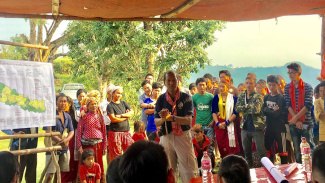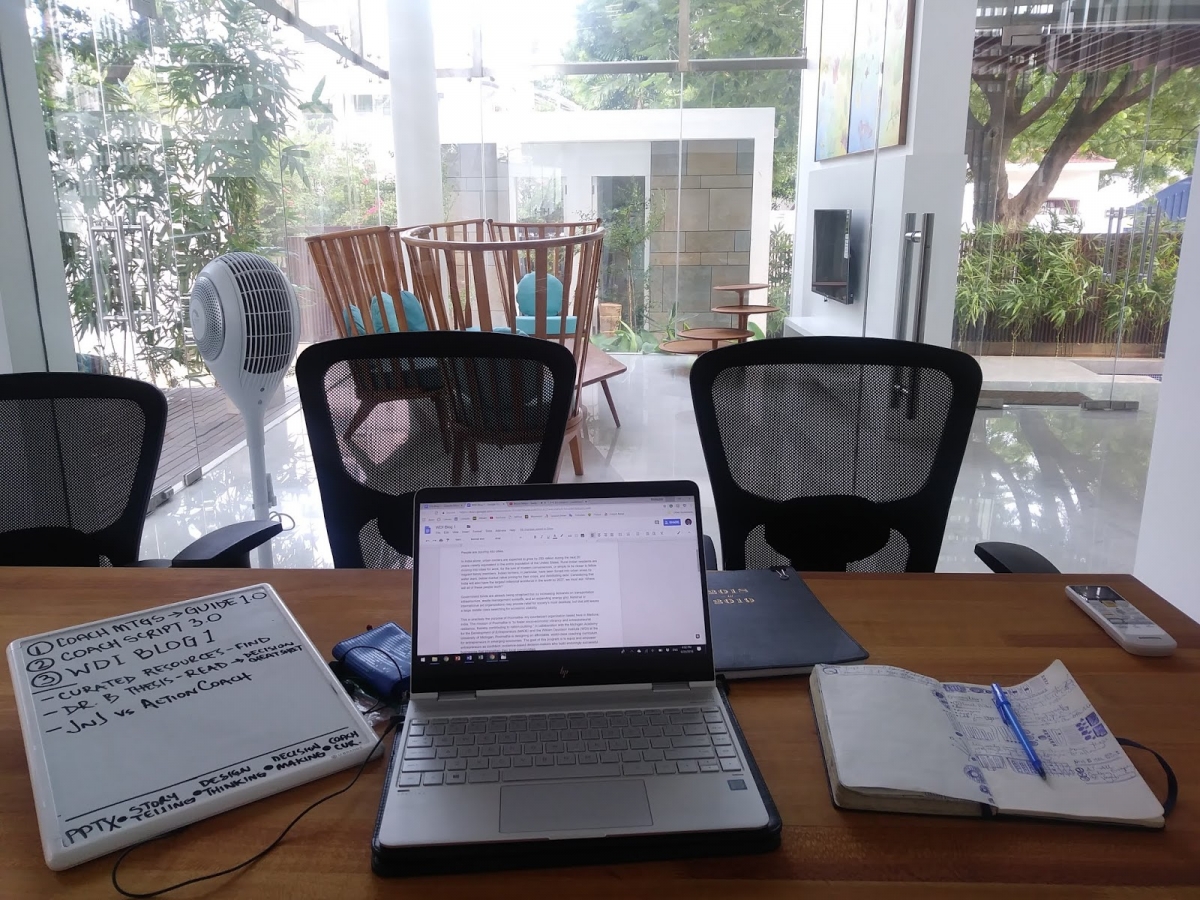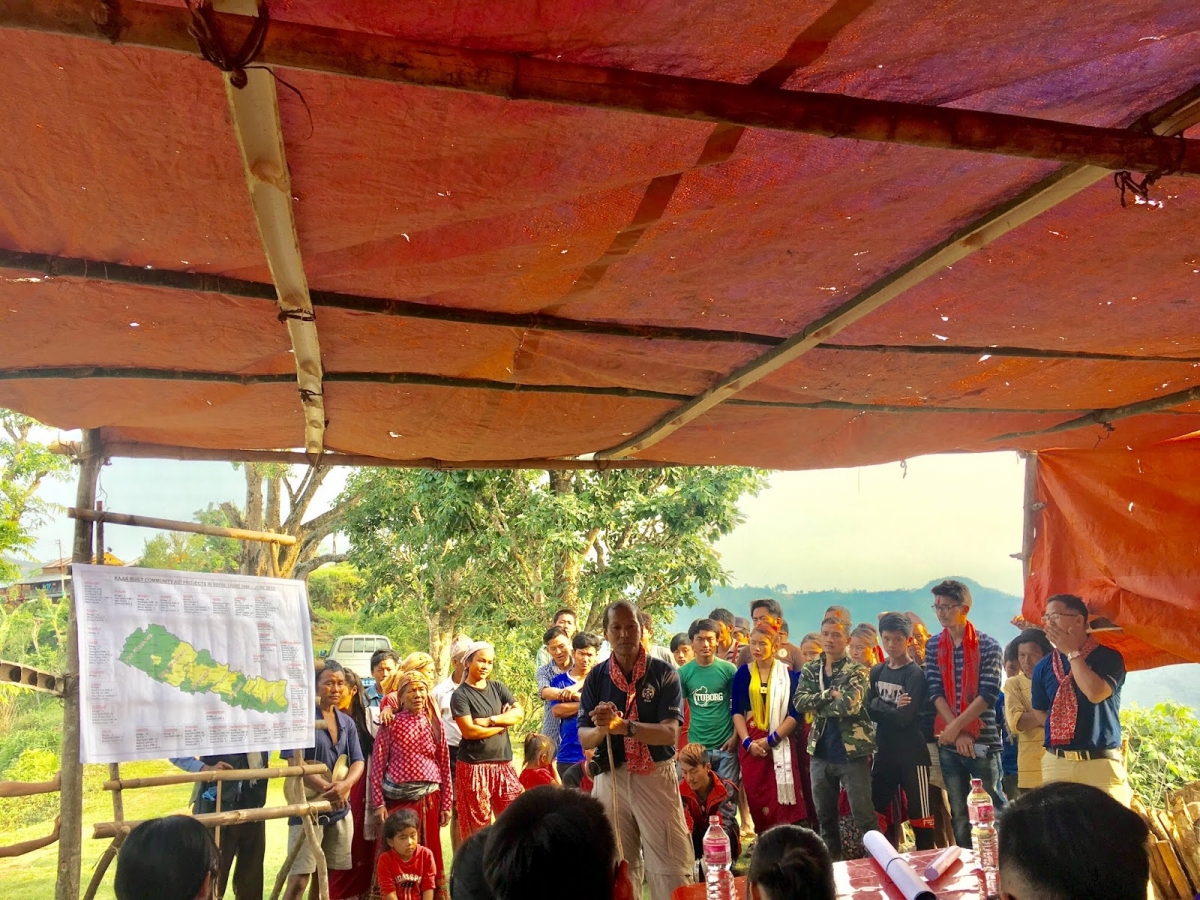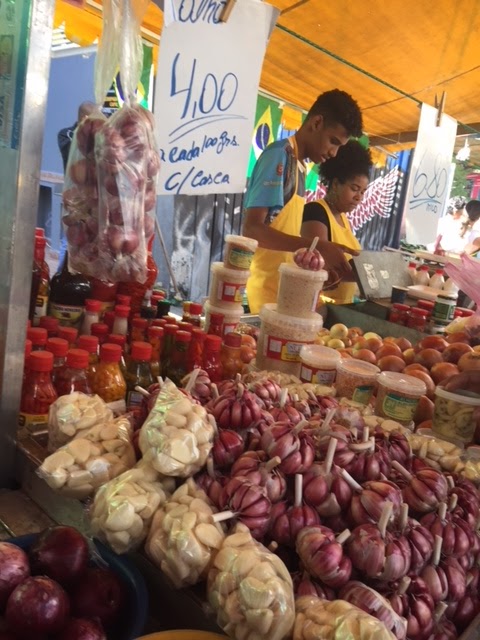Day(s) In The Life: Four Stories From Michigan Ross Students Working In Emerging Markets This Summer

These reflections were originally posted by students to the WDI blog, they’ve been republished here with permission.
This summer, four Michigan Ross full-time MBA students are participating in summer internships in emerging markets across the world, as part of the Global Impact internship Program from the William Davidson Institute.
The program offers graduate students across the University of Michigan the opportunity to work with businesses and organizations in emerging market economies on high-level, impactful, paid summer internships — and impactful they are. This summer, students are working on everything from bringing low cost power to areas of rural Nepal, to stabilizing income for cashew farmers in Bali.
The four Ross MBAs recently filed these reports from the field about their work:
JUMP TO A STORY:
Entrepreneurship in India | Cashew Farmers in Bali
Solar Power in Nepal | Gender Equality in Brazil
Developing Entrepreneurship Ecosystems in India
Working with Michigan Academy for the Development of Entrepreneurs
By Chris Owen, MBA/MS ‘20

Madurai, India — No morning alarm needed here in Madurai. Prayers are projected from a nearby temple via loudspeaker at 4:30 every morning. A street sweeper with bells on his broom acts as my 5 a.m. snooze button. And of course, the cacophony of beeps and bells, horns and honks by motos, bikes, and buses begins at six—a definitive dream crusher.
In India alone, urban centers are expected to grow by 250 million during the next 20 years--nearly equivalent to the entire population of the United States. Considering that India will also have the largest millennial workforce in the world by 2027, we must ask: Where will all of these people work?
Government funds are already being stretched thin by increasing demands on transportation infrastructure, waste management systems, and an expanding energy grid. National or international aid organizations may provide relief for society’s most destitute, but that still leaves a large middle class searching for economic stability.
This is precisely the purpose of Poornatha--my counterpart organization based here in Madurai, India. The mission of Poornatha is “to foster socio-economic vibrancy and entrepreneurial resilience, thereby contributing to nation-building.” In collaboration with the Michigan Academy for the Development of Entrepreneurs (MADE) and the William Davidson Institute (WDI) at the University of Michigan, Poornatha is designing an affordable, world-class coaching curriculum for entrepreneurs in emerging economies. The goal of this program is to equip and empower entrepreneurs as confident, evidence-based decision-makers who build enduringly successful businesses that strengthen their local communities.
Madurai is an ideal test site for this program. Located in the southern state of Tamil Nadu, Madurai is a gritty trading center with an aspiring manufacturing sector, reminiscent of an American Rust Belt metropolis. It’s home to rubber factories, sand mines, raw material distributors, a robust textile industry, and an engaged entrepreneurship network. Poonatha provides first, second, and third generation entrepreneurs in Madurai with training in cash flow analysis, marketing and brand management, leadership development and, most importantly, data-driven decision-making. Our hope is that this program helps cultivate a business ecosystem that ensures stable, sustainable economic growth for the region.
Overall, by investing in strong local economies, India can address its dual-challenges of rapid urbanization and rising unemployment. Indeed, for this reason, entrepreneurship in India--and the work of Poornatha--is becoming increasingly important.
Empowering Female Cashew Farmers in Bali
Working with East Bali Cashews
By Nadia Putri, MBA ‘19

the splitting machine.
Desa Ban, Karangasem, Bali — In 2012, Aaron Fishman travelled to rural East Bali as a healthcare volunteer and was amazed by the beauty of this region. But, he soon discovered that behind the beauty, East Bali is an impoverished region of farmers. Ninety eight percent of people who live in Desa Ban (Ban Village), Karangasem Region, East Bali are cashew farmers. Farmers sold raw cashews to traders who shipped them overseas for processing.
Aaron saw an opportunity to create a sustainable economic solution for these farmers and their families through agriculture and food processing. That’s how East Bali Cashews (EBC) was born in Desa Ban. Now, EBC employs more than 400 people with the majority being women from local area.
The company has touched many lives of people in Desa Ban, as beautifully expressed by Ibu Lasmi, “I’m only a high school graduate, yet, the company believes in me and my potential. Never would I have imagined moving up from a daily worker to managing more than 50 workers myself.”
In addition, not only focusing on its social impact, EBC also puts high importance on its product quality. Boasting a wide variety of unique ingredients from East Bali, the company is aiming to deliver tropical indulgence from Desa Ban to consumers worldwide.
This summer, I’m honored to be chosen as one of WDI Global Impact Fellows to work at EBC as a business development intern. As a rapidly growing social enterprise, one person at this company wears many hats and so do I. My role in the company is divided into two: while I’m at Desa Ban factory, I’ll be working on quality improvement projects and also summarizing the company’s impact on women employees. In comparison, while I’m at Bali/Jakarta office, I’ll be looking into US market entry strategy. I'm very excited to be back in home country, working at a company that delivers real social impact to the community.
My first couple of weeks at EBC factory has been quite eventful. While in Desa Ban, I’m staying at EBC’s campsite (called East Bali Immersion) where I get to sleep in a tipi. As a city girl myself, it’s an amazing feeling to wake up to rooster crows, sleep to cricket’s sound, and shower under the open sky.
At the factory, everyone is very welcoming and open to share their stories. It’s especially humbling to see such high curiosity and willingness to learn from the factory employees. This serves as my daily reminder that situation you grew up or lived in does not define who you could be.
Realizing Solar's Potential in Rural Nepal
Working with Ecoprise
By Matthew Carney, MBA/MS ‘20

Terai Region, Nepal — This summer I'm working with the solar startup Ecoprise to help bring solar-powered agricultural services to subsistence farmers in the Terai region of Nepal. As I write this, farmers in rural Nepal are preparing for the approaching monsoon season.
Nearly two thirds of Nepal’s working population is made up of farmers, who rely extensively on the rainy summer season for irrigation given Nepal’s isolating topography and lack of infrastructure. Even with significant rainfall, rural farmers have difficulty maintaining their farms due to the high costs associated with pumping groundwater. This loss of productivity often prevents farmers from breaking out of a cycle of poverty. Thankfully, the emergence of solar-powered agricultural services could help reverse this trend and ensure that rural farmers can cultivate their land year-round.
In Nepal, only 40 percent of the country’s population — mostly in urban areas — has reliable access to electricity. In rural areas, that falls to a staggeringly low 5 percent. Despite this, Nepal benefits from more than 300 days of sun per year. The combination of Nepal’s natural solar capacity, plus its lack of electrical infrastructure in rural areas, makes it a prime target for solar-powered agricultural services.
In 2015, Ecoprise partnered with the International Center for Integrated Mountain Development (ICIMOD) and SunFarmer — two nonprofits operating in Nepal — to provide photovoltaic (PV) water pump infrastructure projects in the Terai region district of Nepal. The sites were monitored over the course of the following year, with increasingly positive results. By using the solar-powered water pumps, these farmers were able to irrigate 24 percent more land during the winter months and 29 percent more land during the monsoon season. It also reduced the use of diesel-powered water pumps by 75 percent, saving the average farmer ~$500 per year.
Despite these encouraging signs, there is quite a distance yet to go. The farmers that participated in this pilot program tended to have more land, better access to irrigation, and own more pumps than the average Nepali farmer. In order to ensure equity of access, it will be critical for private enterprises and non-profits to work together to ensure solar-powered agricultural solutions can be made affordable for the farmers that could benefit most from the technology.
Solar-powered agriculture presents an opportunity to raise the living standards of millions of rural Nepali farmers in a sustainable fashion — it would be a shame to waste it.
Promoting Gender-Equality in Brazil
Working with Plan International Brazil
By Rebecca Grossman-Kahn, MBA ‘19

São Paulo, Brazil — I am thrilled to be a WDI fellow this summer working with Plan International Brazil. Plan international is a global development organization with a focus on the health, safety, and education of children. The organization was founded in 1937 and is now active in 70 countries.
Programs in Brazil began in 1997 and are headquartered in São Paulo, with program offices throughout northeast Brazil where poverty rates are highest. In the remote northern state of Maranhão, the average per capita monthly income is $157, less than half of Brazil’s national average.
In recent years, Plan Brazil has shifted its program focus to gender equality; the current programs are designed to reduce gender-based violence, promote reproductive health and healthy relationships, and advance female leadership and representation in Brazilian society and politics.
Child marriage is a particular problem in Brazil. Brazil ranks 4th in the world for absolute number of married or cohabiting girls under age 15. Brazil ranks 4th in the world for absolute number of women who gave birth by age 18, following India, Bangladesh and Nigeria. A recent study by Plan and Promundo found that the high rate of child marriage in Northeast Brazil is closely associated with unplanned adolescent pregnancy, interpersonal violence, limited economic opportunities for girls, and social beliefs about gender. Plan notes that its work is especially crucial in a climate of reduced federal support for reducing gender-based violence; the funds for tackling violence and promoting women’s equality were reduced by 74 percent in this year’s federal budget.
Plan Brazil implements numerous interventions with young boys and girls. One of their flagship programs is a female football league, in which girls learn to challenge gender stereotypes and occupy social spaces traditionally dominated by boys. Other programs train adolescents to teach their peers about reproductive health, teach young children how to protect themselves against child abuse, and enroll young women in an extracurricular Leadership School with modules on human rights and political participation. To learn more, check out this video.
My project this summer is focused on performance measurement. Before arriving in Brazil, I spent one week at the WDI office preparing and learning a ton about social impact measurement from the brilliant Performance Measurement Initiative team. I’ll be working with the Plan team to analyze their current monitoring and evaluation practices and launch a new methodology in order to capture the social impact that Plan’s work aims to achieve. I’ll also be collaborating with the finance team on a cost analysis project.
In total there are six summer fellows participating in the program this year, four from Michigan Ross, one from the College of Pharmacy, and one from the School of Public Health. You can read all of their reflections on the WDI Blog.







